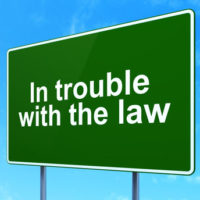When Defamation & Free Speech Turns Into a Crime

While many people assume that defamation is an issue for civil court, in fact, a number of states also have laws that make defamation a criminal act, including in Florida. In Florida, any person convicted of the publication of libel is guilty of a first degree misdemeanor, and that includes the owner or editor of the publication. The law also has some archaic language in it, dictating that “whoever speaks of and concerning any woman, falsely maliciously imputing to her a want of chastity” shall be guilty of a first degree misdemeanor. It also contains specific language regarding punishment for making derogatory statements “concerning banks and building and loan associations.” Anyone who communicates libelous matter to a publication is also guilty of a second degree misdemeanor.
Where these provisions become concerning is when they are used to harass individuals exercising their free speech rights, for example, someone who is arrested for making a public comment on Facebook about the local police. Isn’t this a violation of our constitutional rights?
Dubious Criminal Charges
Arguably, our world is awash with comments and claims that could technically fall under these types of statutes every moment of every day. If even one percent of them were prosecuted, our judicial system would be beyond overwhelmed. Perhaps more concerning is the fact that, when they are prosecuted, it usually involves enforcement going after people who have criticized those in power.
Aside from the overarching question as to whether any of these state statutes are constitutionally valid, the criminal charges in these cases are nothing short of dubious. Take a look at one case in Georgia, where a woman posted a joke on Facebook about her husband refusing to go to the store to get more medicine for their children. That individual—who eventually became her ex—was a captain in the local sheriff’s department, and had her arrested.
In fact, it has become such an issue that, in some states, attorney generals have had to issue statements pointing out to the public, and the police department, that simply because someone makes a statement that they feel is false does not somehow criminalize that free speech, especially if other requirements of the law are missing. The legal standard is not whether a statement is true, especially given that we as citizens have the First Amendment right to express our opinions.
While defamation is a long-recognized exception to First Amendment free-speech protections, and statutes like those in Florida have been around a long time, when a statute is written so as to be impermissibly vague such that it fails to provide notice to ordinary people regarding what, exactly, is prohibited and/or if it encourages discriminatory enforcement, it can be held invalid.
Contact Our Florida Criminal Defense Attorneys
If you have been arrested for a crime that arguably violates your constitutional rights, contact our Florida criminal defense attorneys at the office of William Wallshein, P.A. today to find out how we can help.
Resource:
theatlantic.com/ideas/archive/2018/12/aclu-test-case-takes-aim-criminal-defamation-laws/578383/
unionleader.com/news/courts/exeter-man-seeks-after-defamation-charge-dropped/article_3e8e532e-f4a4-522b-a60c-854600bd782f.html
